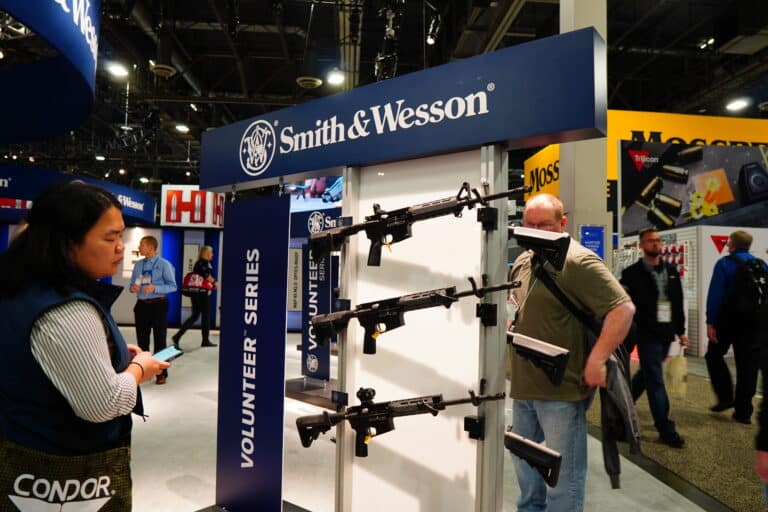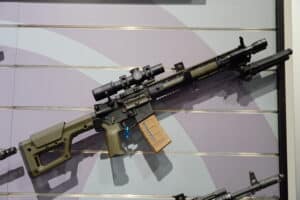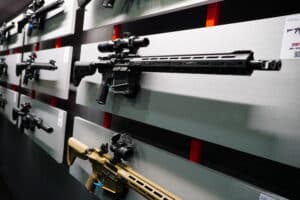Delaware’s “assault weapons” ban and magazine capacity limit can remain in place, according to a ruling handed down on Monday.
Federal District Judge Richard G. Andrews, an Obama appointee, found the state’s ban on AR-15s, AK-47s, and similar firearms is consistent with the Second Amendment. He ruled the same way on the state’s ban on large capacity magazines (LCMs), which the state defined as any magazine that holds more than 17 rounds of ammunition. He decided the bans were constitutional despite finding that the guns and magazines they target are in common use for self-defense.
“[I] conclude that the prohibited LCMs, like the prohibited assault long guns, are in common use for self-defense and therefore ‘presumptively protect[ed]’ by the Second Amendment,” Judge Andrews wrote in his opinion.
Instead, Judge Andrews said the guns and magazines prohibited by Delaware represent a “dramatic technological change and unprecedented societal concerns for public safety” because semi-automatic firearms were not popular before the 20th Century and have been used in high-profile mass shootings. He argued that meant Delaware only needed to show a tradition of regulating guns in a similar, though not identical way, under the standard set in the Supreme Court’s New York State Rifle and Pistol Association v. Bruen decision. He pointed to late 19th and early 20th Century bans on bowie knives, billy clubs, and concealed pistols as acceptable analogues.
“I find that the LCM and assault long gun prohibitions of HB 450 and SS 1 for SB 6 are consistent with the Nation’s historical tradition of firearm regulation,” he ruled in Delaware State Sportsmen’s Association v. Delaware Department of Safety and Homeland Security. “Plaintiffs have therefore failed to demonstrate a likelihood of success on the merits of their Second Amendment claim.”
The ruling is a setback for gun-rights advocates who have been fighting “assault weapons” bans in court for years. Judge Andrews’ reasoning is nearly identical to one used by a federal judge to deny an attempt to block Oregon’s prohibition on LCMs, which suggests the post-Bruen legal argument for such bans is beginning to coalesce. It also lets Delaware continue to enforce its ban for the foreseeable future.
However, the judge’s finding that AR-15s and LCMs are in common use and presumptively protected by the Second Amendment leaves the ban on precarious footing that could see it toppled if a higher court doesn’t see bowie knife bans from a century after the founding as a fitting analogue.
Delaware became the first state to enact a state-wide “assault weapons” ban in 22 years when it passed its law in 2022. Illinois followed up a short time later. Both new bans have faced stiff opposition from gun-rights activists–who have filed suit against the laws–and local law enforcement–who have said they won’t enforce them. Support for such bans has also lost steam with the public over the past year, with a February Quinnipiac University poll finding more opposed to the idea than supportive of it.
In addition to listing out 44 named models, including the AR-15 and AK-47, the state defined an “assault weapon” as any semi-automatic, centerfire rifle that can accept a detachable magazine with one or more prohibited features, such as a telescoping stock or flash suppressor. As with the 17-round limit, Delaware’s “assault weapons” definition differs from those employed by several other states with similarly-named bans.
Judge Andrews ultimately found the burden imposed by the gun and magazine ban is minimal and a worthwhile tradeoff for the public safety benefits the state claims it achieves.
“[B]oth sets of regulations impose a ‘comparable burden,” he wrote. “Indeed, the burden that the challenged regulations impose is slight.”
The Delaware State Sportsmen’s Association did not respond to a request for comment about whether they planned to file an appeal.







Only Members can view comments. Become a member today to join the conversation.